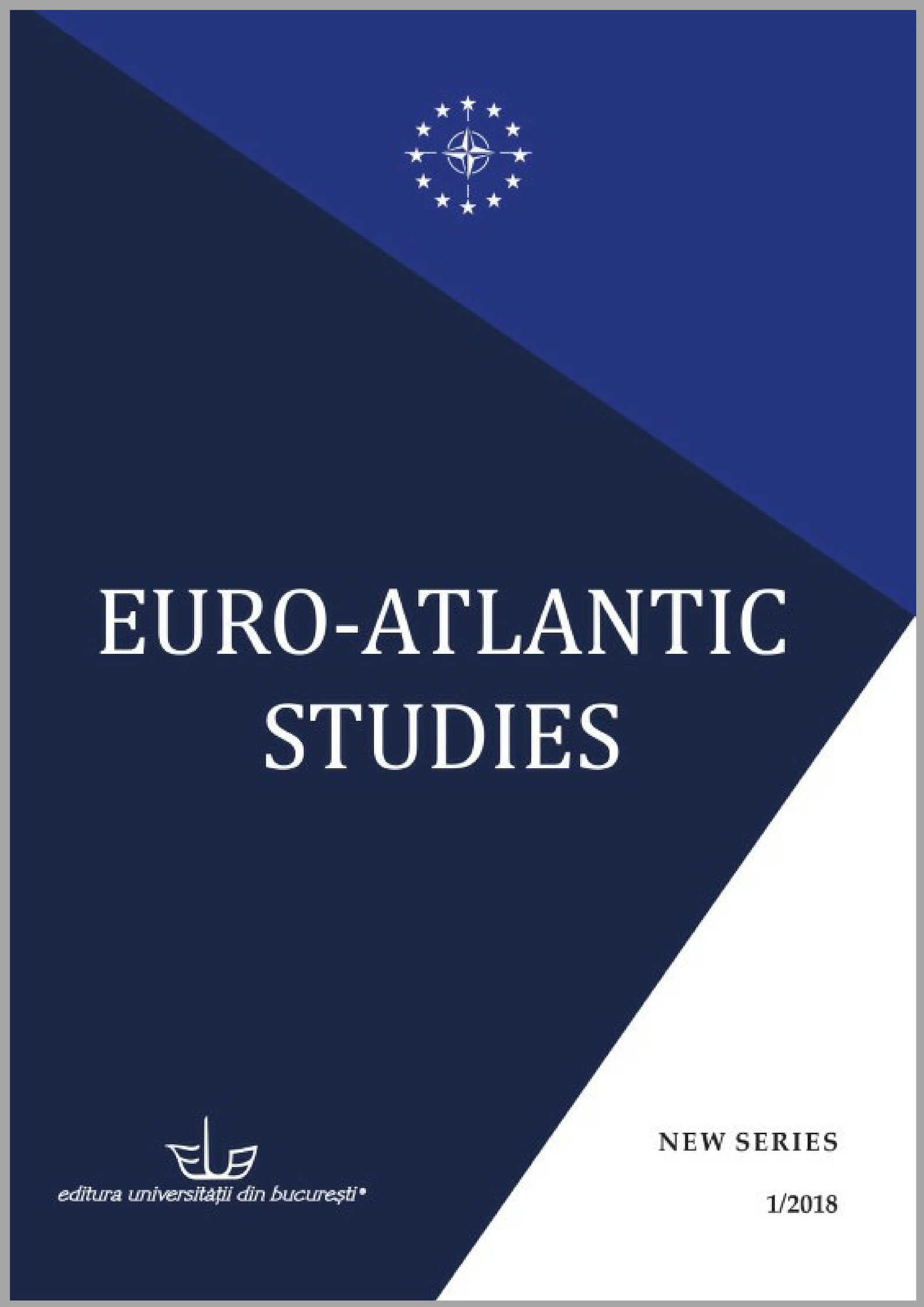
We kindly inform you that, as long as the subject affiliation of our 300.000+ articles is in progress, you might get unsufficient or no results on your third level or second level search. In this case, please broaden your search criteria.

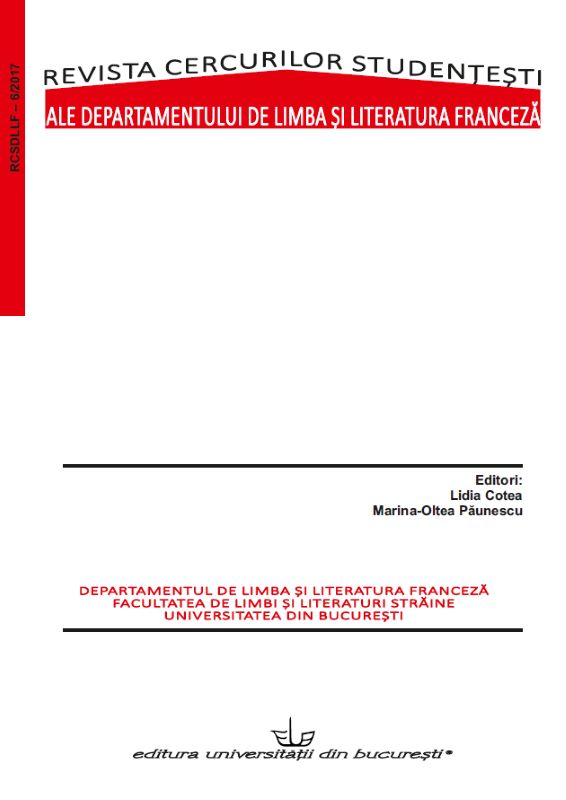
The work hereby starts with the explanation for provenance of a folk dress seen in the painting Romanian Lady by F. A. Bridgman, identified as the region of Muscel. It also presents the interest shown by queen Elisabeth of Romania for the folk dress, particularly the Muscel one, which she used to wear in many occasions and her way of using the folk dress in several campaigns, especially to promote the country abroad. The research shows that this interest is due to Ana Davila, Romanian with noble descent, and the tradition Ana followed in this matter, serving the ideals of equality, fraternity, liberty and national union. We show the influence of the activities done by Ana Davila and her relatives to the artistic creation between 1850-1860, to the beginnings of ethnographic research in Romania and to the development of national identity and conscience whose most important promoter at the time was queen Elisabeth of Romania.
More...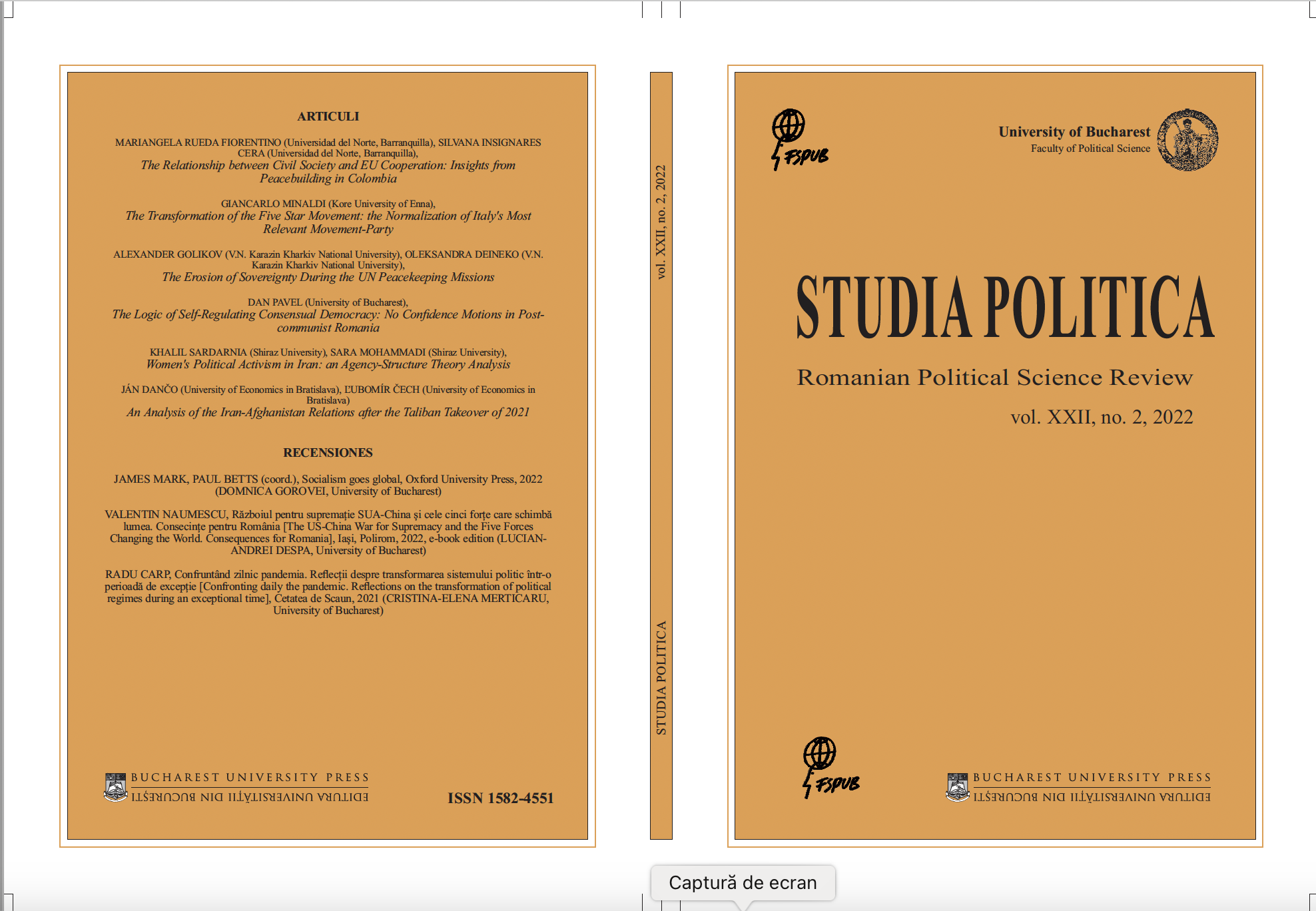
Since the onset of the Great Recession more than a decade ago, new political actors have emerged, whose platforms are predominantly based on opposition to economic austerity as well as a radical critique of traditional politics. Faced with the newness of these formations, alongside the issues they bring to the forefront of political discourse, social science scholars have produced innovative concepts to address the specificities of these new actors. Some fifteen years have now passed since the recession, and so we believe the time has come to scale back the emphasis on “newness” and rather turn our attention to the analysis of the progressive normalization of discourses, structures, and repertoires of action. Through the classic literature on political parties, this analysis aims to trace the stages of the development of the Five Star Movement, from the birth of its political project to its most recent developments. Pedersen’s concept of “thresholds” combined with the literature on the formation of political parties allow us to trace the rapid path of organisational structuring, whose first manifestations emerge as early as the first parliamentary representation. Our analysis looks at the transformation of the Five Star Movement from an outside political actor to an inside political actor in parallel with the stabilisation of its organisational structure, which increasingly has come to resemble the form of a traditional party.
More...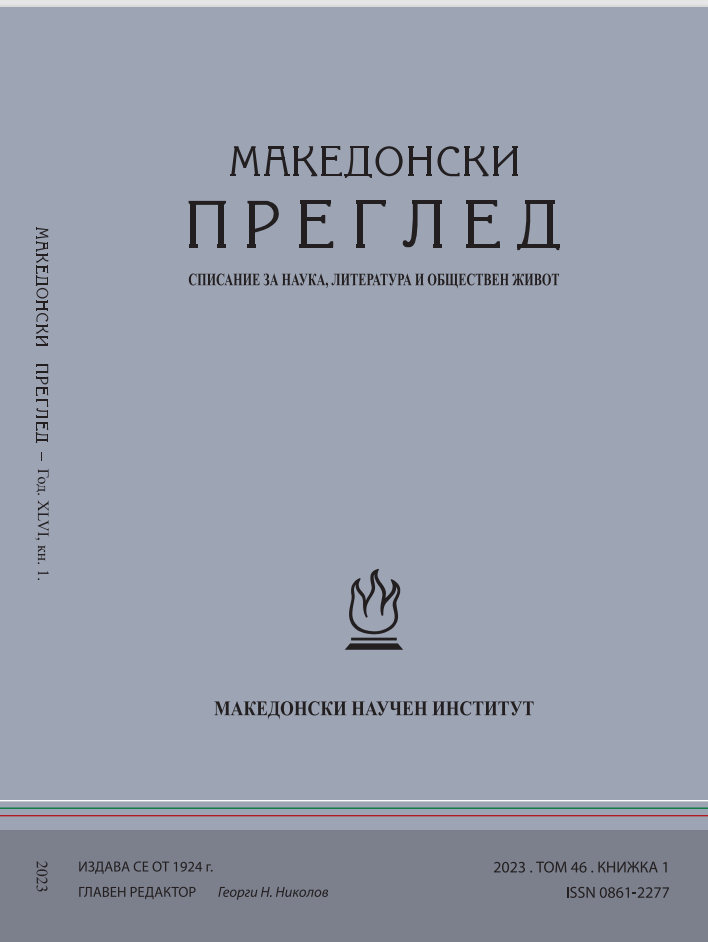
Metropolitan Philaret of Loveč was among the synodal bishops entrusted with the administration of the dioceses rejoined to the Bulgarian Church in April 1941. The Metropolitan was appointed to rule the Ohrid-Bitola Diocese. By accepting his new appointment, he distinguished himself behaving with tact and moderation, showed understanding and sensitivity for the local Bulgarians’ pains and aspirations. At the beginning of September 1944, together with the state administration and military units, Bulgarian ecclesiastical authorities were forced to withdraw from the newly liberated lands. Before leaving his position, Philaret of Loveč manifested responsibility and took care of church matters that his diocese in charge did not fall into chaos due to the looming lawlessness.
More...
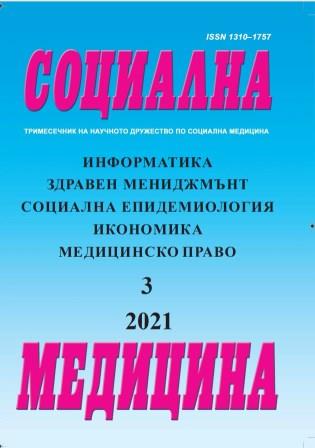
While the paper reveals details for an impressive donation of doctor Hristo Momchilov from Elena town in 1928 towards his native town, it sheds light on the philanthropic practices common for Bulgaria after the Liberation of the country in 1876. Attention needs not only the act of giving itself but rather the important issues of the day and their social causes addressed with the donation.
More...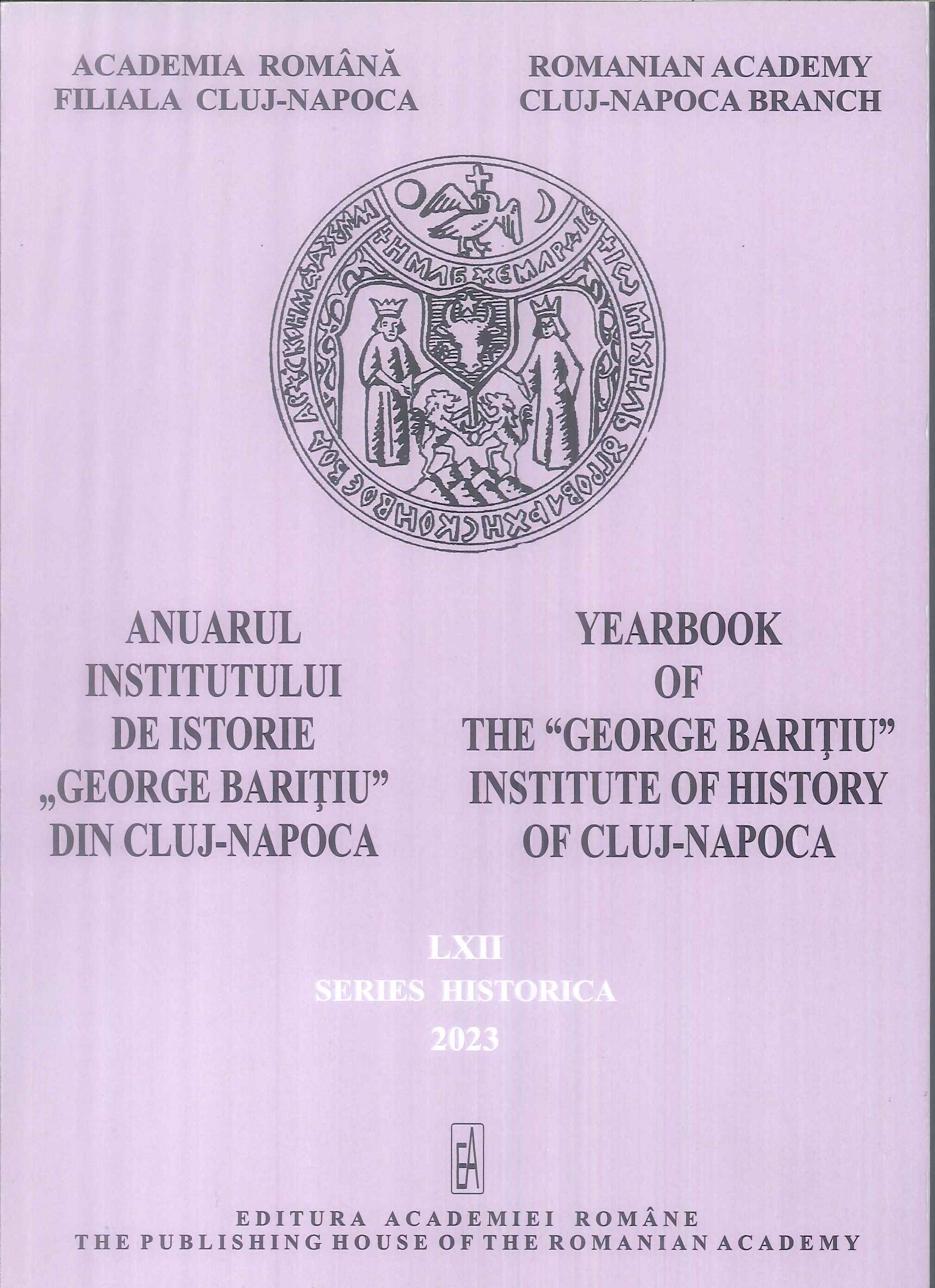
This paper analyses the right of inheritance on the feminine line in medieval Transylvania, through the history of a noble family residing in Sântioana, in the Târnava county. The aim of this study is to highlight the practice of inheritance by girls from this noble family with increased attention on the category of goods they acquired, the right to own them, the importance of feminine inheritance for the girls and their descendants and the courts before which the inheritance disputes have been tried.
More...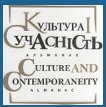
The purpose of the article is to study the factor of traditionalism in the development of the complex of murals of the Great Church (the Dormition Cathedral) in the 18th – 21st centuries. The research methodology is based on historical, cultural and art historical analysis. Scientific novelty of the study. Traditionalism is defined as a factor in the development of mural painting of the Kyiv-Pechersk Lavra’s Great Church (the Dormition Cathedral) in the 1720s–2020s. The author reveals that traditionality was implemented in the principle of continuity in the formation of new murals. The imitation of a number of thematic and narrative lines of the seventeenth-century murals in the decorations of the 1720s, as well as the murals of the 1720s and 1770s in the compositions of 1811 and the decorations of the late nineteenth century is studied. The author proves that the main visual source of the reconstruction of the twenty-first century painting was not the painting of the 1720s but of 1840-1843 and some compositions of the 1770s and 1811. The change in the location of traditional subjects is identified as one of the means of innovation in the programmes of new paintings. The continuity of a wide range of compositions, including the themes of the Baptism of Rus and the Pechersk Monastery, is traced. Conclusions. Traditionalism had a significant impact on the development of the monumental painting of the Great Assumption Church in the 18th-21st century. The programmes of the new paintings of the 1720s and especially of 1894 show the imitation of thematic and narrative lines from the previous paintings. During the renovation of the entire church interior (1772–1777, 1840–1843) and exterior (1809), as well as the renovation of certain compositions (for example, in 1811), he imitation of paintings was almost unchanged (this was a requirement of the Kyiv metropolitans). According to the principle of continuity in the XXI century, artists created a baroque image of the Great Church, using archival sources of paintings from 1840-1843, 1811, and 1772-1777. The continuity provided a historical connection between the murals of different centuries in the Dormition Cathedral.
More...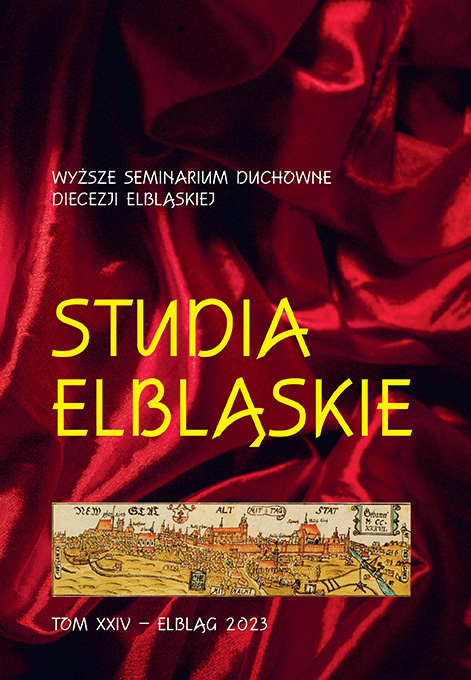
This article is devoted to the burial chapel of the Donimirski family in Czernin (ger. Hohendorf). From the sources researched, it is known that it was built in the second half of the nineteenth century on the order of Piotr Alkantara Marcin Donimirski. The author takes a closer look at the stages of construction of this chapel, its furnishings, the renovations carried out, as well as its condition before, during and after the Second World War. The following are buried in this place: Piotr, Wacław, Zygmunt and Czesław Donimirski. The chapel was also the place where the baptism and first communion of Witold Donimirski’s children were elebrated (after 1900). During the communist regime it was devastated and the remains of the deceased insulted.
More...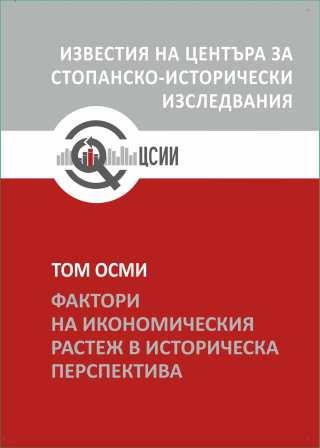
The article discusses the role and function of the Moesian provincial official of the Emperor – the procurator. The sources about the Roman provincial history generally indicate that the procurators were equestrian officers charged with the care of the Emperor's property. The epigraphic data from the province of Lower Moesia (Moesia inferior) do not conclusively show that there was a procurator here who was responsible specifically for the imperial domains. The investigation of the known monuments that mention procuratores leads to the conclusion that the procurator of the vectigalis Illyrici assumed in Lower Moesia the functions of supplying the Roman troops in that part of the Empire, the provinces of Lower Moesia, and some periods mainly the neighbouring lands, as Upper Moesia and Dacia. In Lower Moesia, where strategic territories belonging to the "defense" of the province were available, the transitional period of early Roman power in these lands led to the imposition there of a military administration, which was more it was later merged with the Illyrian vectigalis. Thus, around the time of the Severi, when the vectigal was subordinated to an equestrian procuratoral office, put the end of the short period of economic development in the province of Lower Moesia, understood as the enrichment of some northern Italian families from the border commercial location of the lower Danube lands. By the 3rd century AD this frontier arrangement goes back to the early Roman development, which was entirely subordinated to the army and military affairs.
More...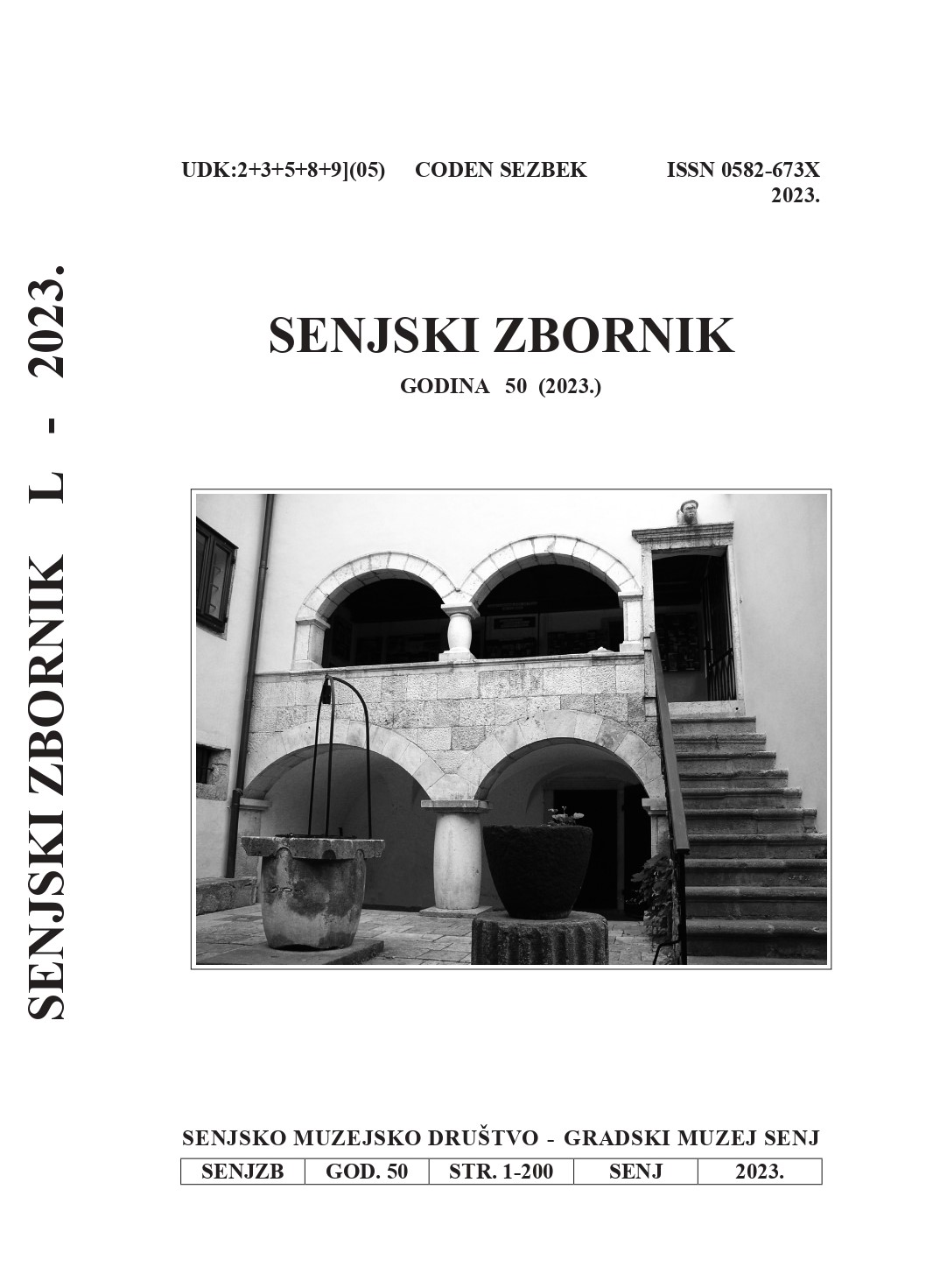
In this paper, the author examines the actions and involvement of Vatroslav Cihlar, who was a student at the Nautical School in Bakar during the student strike in 1912. The paper especially wants to look at his role in the struggle against the politics of the ban of the time Slavko Cuvaj. The student strike is placed in a historical context, and the events related to those events at the local level, its course and the consequences felt by the participants, the students, and therein Vatroslav Cihlar until it finished, are analysed with an insight at preserved archival and periodical materials.
More...
The situation in one of the most destroyed Croatian towns in the Second World War conditioned the need for the gathering of professions and politics in Senj. In the bombings of 1943 and 1944-1945, between 70% and 80% of the building stock was destroyed. Disunity in opinions between the citizenry, politics and conservation services hindered any progress. One of the first activities of the Senj Town Museum, after its formal establishment in 1962, was the Consultation about the arrangement and contemporary use of the Nehaj fortress debate. It took place in the premises of the Fortress on 22nd July in 1963. It brought together the most eminent experts in the field of monument heritage protection, planning and design, as well as representatives of the political structures of the then State, Republic, District, Town and the army. The significance of the Consultation lay in the decisions made, which were given formal and executive powers. This one-day assembly showed how exceptional efficiency and unity can be achieved with good preparation, especially regarding the position regarding the sources and methods of financing the renovation and stipulating the purpose (for example, exclusively tourist or hospitality). Nehaj was intended to be arranged as a museum to house the Uskok Collection, in accordance with all modern conservation knowledge and methods. The Consultation was one of the cornerstones of the subsequent activities of the Senj Town Museum, of the first director Ante Glavičić and his collaborators and successors, in the systematic reconnaissance and restoration of the architectural heritage of Senj. It was placed in the context of the post-war period and the reconstruction and revitalisation of the architectural heritage that had already been started and/ or carried out. It also looks at the role of some of the main stakeholders in decision-making (the People’s Committee of the Municipality of Senj, the Senj Museum Society, the Senj Town Museum, the Council of Citizens for the Reconstruction of the Nehaj Fortress), consideration and design (JAZU Yugoslav Academy of Sciences and Arts, conservation institutes in Rijeka and Zagreb), as well as the organisational processes and circumstances of the carrying out of the works (Stonemason’s group, engineers M. Hudec and K. Prpić). Amongst the results prompted by the guidelines and conclusions of the Consultation, the systematic work on the collection of archival materials (M. Viličić, A. Glavičić) necessary for the preparation of projects (J. Denzler, M. Viličić, conservation institutes) and the planning of the Uskok and other museum collections, architectural surveying of the old town centre and the Nehaj fortress (M. Viličić), the established good cooperation with scientific and professional institutions, conservators and architects, preparation of studies and scientific papers on the subject of architectural monuments of Senj and more all stand out. It is especially worth looking at those beginnings in the light of Senj’s architectural heritage (without the archaeological) today registered in the Register of Cultural Property of the Republic of Croatia as permanently (10 lots) or preventively protected (1 lot).
More...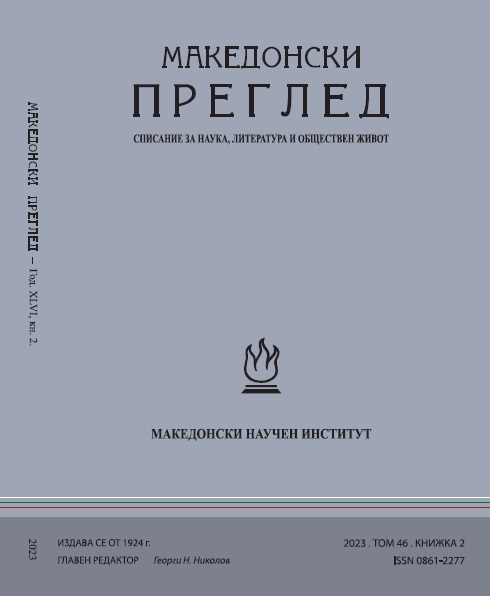
Both dialectal texts in the article were collected in Toronto, Canada from two informants belonging to two different generations and originating from the villages of Gàbresh and Drenòveni in the Kostur (Kastoria) region. They disclose new and never published information on the IMARO’s activities, the fate of the Bulgarian language in South-western Macedonia under Greek rule, the difficulties of the locals to visit their native villages during the years of the Greek Military Junta (1967 – 1974); they also contain some comments made by Atatürk on Bulgaria’s behalf. History and dialects of the area remain under studied, due to the Greek rule exerted on this area and its heavy assimilatory policies. The new information will help fill the gap, even to a small extent. The texts also serve as a supplement to Blagoy Shklifov’s work on the Kostur dialect.
More...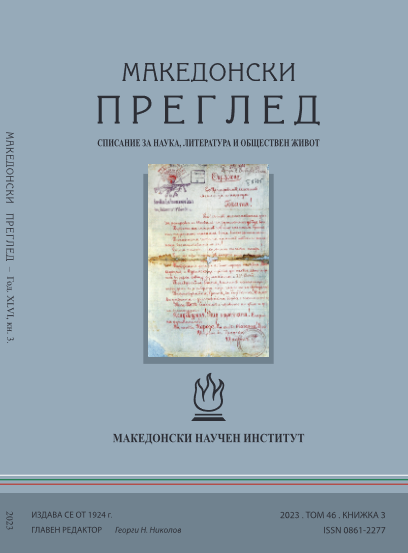
The Ilinden-Preobrazhenie Uprising of 1903 was an uprising of the Macedonian and Thracian Bulgarians in the European vilayets of the Ottoman Empire, supported by the free Bulgarians living in the Principality of Bulgaria. This fact, which is the shortest possible definition of the uprising, has been simultaneously and universally recognized– first of all, by the Ottoman authorities themselves, and together with them – by the jealous and hostile to the Bulgarian national cause Balkan neighbours, as well as by ‘big’ and ‘small’ countries, by international observers of different origins. The questioning of the Bulgarian character of the uprising started to gain momentum much later, with the blurring power of politics and geopolitics which intervened to create misconceptions. This way they turned over time until today into an artificially maintained problem in interstate relations. The Bulgarian Ilinden of 1903 and the revolutionary struggle in Macedonia and Adrianople Thrace in general prepared the Balkan War of 1912. The Macedonian-Adrianople liberation movement provided the Bulgarian national state with the historic chance to solve the all-Bulgarian question inherited from the Revival period: a task with which, unfortunately, the Bulgarian political elite failed to cope.
More...
In the spring of 1876, during the April Uprising against the Ottoman Empire, the Bulgarians used homemade wooden artillery: the so-called cherry cannons. Its real effect was insignificant, but it had a certain moral impact: it raised the fighting spirit of the insurgents. Nearly thirty years later – during the Ilinden Preobrazhenie Uprising – the Bulgarians again used the same type of cannons. If in 1876 wooden cannons were an extremely outdated technology that was almost without analogue, at least in Europe, then at the beginning of the 20thcentury their manufacture and attempts to use them appeared to be an absolute, hard-to-explain anachronism. The main explanation for the use of this ‘artillery’ by Ilinden-insurgents was the fact that they were inspired by the same ideals, by the same urge for freedom, as their oppressed countrymen of nearly three decades ago.
More...
Among the newspapers that shaped the level of knowledge of Poles in Galicia, the daily Czas newspaper played an important role. This also concerned the Ilinden-Preobrazhenie Uprising, to which the paper devoted much attention, informing its readers objectively and extensively about the events taking place in the Balkans. The article deals with the journalistic coverage of the Ilinden-Preobrazhenie Uprising and the preparations therefor, as provided by the Polish Cracow-based daily newspaper Czas in 1903, placed on the background of the intricate geopolitical developments of that time. The articles meticulously refers to all the publications made by Czas on these issues.
More...
The situation of the three Macedonian vilayets has been traced conscientiously by Austro-Hungarian authorities at the turn of the century according to the consular reports of the HHStA and the series of reports published in Diplomatische Aktenstücke in 1906. These included observations on schooling, ethnic and religious situations prior to the outbreak of the Ilinden revolt. These documents testify that Austria-Hungary wanted to exploit the growing unrest for its own political purposes by initiating a reform plan that would give the right for Vienna to interfere into the internal affairs of Ottoman Turkey, maintaining its integrity under the aegis of a humanitarian intervention together with Russia. This is highlighted by the fact that several versions of ethnic maps and conscription of schools did exist at the turn of the century in the Austrian consular agencies with often contradictory or manipulated contents, depending on the actual political relations towards the Ottomans and Bulgaria. The worsening economic situation in Macedonia was also detected by the local Austro-Hungarian authorities,and this, together with the increasing observations on political and “everyday” violence and migration gave a good pretext to intervene together with Russia, as the Ottoman reform plans in 1902 were considered unsatisfactory both by the Powers and the Bulgarians. Knowing the Austro-Russian endeavour to intervene, and considering the plans of the Powers unsatisfactory, the IMARO acted prematurely fearing of a modest agreement between Ottomans and the Powers over Macedonia.
More...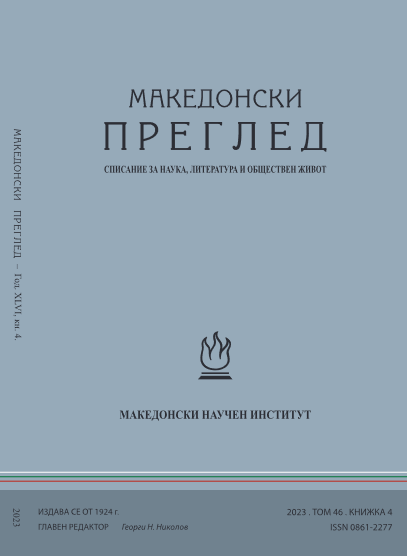
The Archiv of the Bulgarian Academy of Sciences contains several notebooks and a typewritten text in which the famous Bulgarian scholar, Prof. Yordan Ivanov, described his impressions of his first trip to Macedonia, when he was collecting materials for his future book Bulgarian Antiquities around Macedonia. These notes have not been published until now. They obviously served Y. Ivanov in the preparation of his monograph, but at the same time they differ from its scientific style. The notes also contain factual material, but it is secondary to the personal impressions of the author’s encounters with ordinary people, to his reflections on the political situation in the Ottoman Empire after the Ilinden-Preobrazhenie Uprising of 1903, to poetic descriptions of nature landmarks, etc. The said manuscript materials from the archive constitute a special kind of scholarly travelogue, an artistic description of unknown but also familiar lands. In 1906, the Bulgarian scholar visited the ‘unknown’ Macedonia for the first time; but she was at the same time ‘familiar’: known from stories about the family history of Y. Ivanov, whose roots were from the Kratovo district. Attached to the article is the transcript of the first notebook, describing Prof. Y. Ivanov’s impressions from his trip from Vrancha to Thessalonica and Athos in October 1906 – January 1907.
More...
The article examines a practically unknown episode of educational and social policy during the Bulgarian rule of Vardar Macedonia 1941 – 1944: the opening of the State Institute for the Deaf and Dumb in Skopje. Regardless of the difficult wartime conditions and the unresolved problems of the deaf community in the old boundaries of the country, the Bulgarian state, guided by responsibility and humanity towards the deaf schoolchildren in the new lands, including Pirot and Vrana districts, made maximum efforts to respond to their needs and to fulfil the endeavour. Unfortunately, despite the finding of a suitable building and its equipment, the secondment of appropriately trained teachers from the three institutes for the deaf and dumb in Bulgaria and the allocation of the necessary budget funds, the activity of the State Institute for the Deaf and Dumb in Skopje, which onlystarted at the end of 1943, was discontinued already at the beginning of 1944 – given the end of classes and the evacuation of a number of educational institutions due to the bombing of the city by the Allies.
More...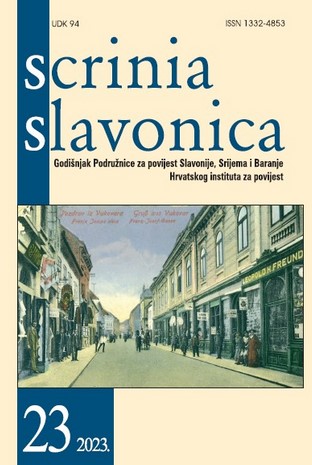
Review of: Antal MOLNÁR: Zagrebačka biskupija i osmanska Slavonija u 17. stoljeću: uloga Katoličke crkve u teritorijalnoj integraciji kontinentalne Hrvatske (Zagreb: Hrvatski institut za povijest, 2022). 225 str. ISBN 978-953-8335-27-3. Kronika Franjevačkog samostana u Vukovaru. Knjiga II (1781.-1826.), transkripcija, kritičko izdanje i prijevod Petar Ušković Croata, stručna redakcija prijevoda Šime Demo (Vukovar: Državni arhiv u Vukovaru - Franjevački samostan Vukovar, 2022). LII + 843 str. ISBN 978-953-7980-33-7. Lidija BARIŠIĆ BOGIŠIĆ: O neslavenskom stanovništvu na vukovarskom području (Zagreb: Hrvatska sveučilišna naklada, 2022). 332 str. ISBN: 978-953-169-497-1. Lidija BARIŠIĆ BOGIŠIĆ: O neslavenskom stanovništvu na vukovarskom području (Zagreb: Hrvatska sveučilišna naklada, 2022). 332 str. ISBN: 978-953-169-497-1. Martina KELAVA i Ivan LUČIĆ: Dnevnik Mate Ivacića (Drenovci: Muzej Cvelferije, 2022). 113 str. ISBN 978-953-48152-5-0. Martina BITUNJAC: Žene i ustaški pokret (Zagreb: Srednja Europa, 2023). 240 str. ISBN 978-953-8281-88-4. Berislav MAJHUT: Na Titonicu: hrvatska dječja književnost u razdoblju socijalističke Jugoslavije (Zagreb: Hrvatska sveučilišna naklada, 2022). 181 str. ISBN 978-953-169-490-2. Károly BUSCH: A háború árnyékában: emlékek, gondolatok (Pécs: Közleke-déstudományi egyesület, 2022). 116 str. ISBN 978-963-8121-96-7. Ivan Vitez – Slavonski plemić, zagrebački kanonik, ugarski primas, promicatelj humanizma, Znanstveni skup povodom 550. godišnjice smrti, Zagreb, 16. rujna 2022. Continuity and Change in Medieval Central Europe. The Fifth Biennial Conference of Medieval Central Europe Research Network (MECERN), Faculty of Arts, Comenius University, Bratislava, 27. – 29. travnja 2023.
More...